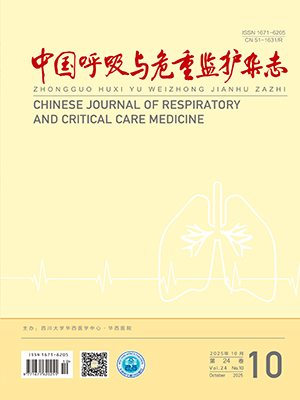| 1. |
Chen W, Zheng R, Baade PD, et al. Cancer statistics in China, 2015. CACancer J Clin, 2016, 66:115-132.
|
| 2. |
Paez JG, Janne PA, Lee JC, et al.EGFR mutations in lung cancer:correlation with clinical response to gefitinib therapy.Science, 2004, 304:1497-1500.
|
| 3. |
Lynch TJ, Bell DW, Scrdella R, et al.Activating mutations in the epidermal growth factor receptor underlying responsiveness of non-small cell lung cancer to gefitinib.N Engl J Med, 2004, 350:2129-2139.
|
| 4. |
杨帆, 陈克终, 刘宏伟, 等.K-ras突变导致肺癌细胞对表皮生长因子受体抑制剂耐药的机制.中华试验外科杂志, 2011, 28:1232-1233.
|
| 5. |
Han SW, Kim TY, Jeon YK, et al.Optimization of patient selection for gefitinib in non-small cell lung cancer by combined analysis of epidermal growth factor receptor mutation, K-ras mutation, and Akt phosphorylation.Clin Cancer Res, 2006, 12:2538-2544.
|
| 6. |
Massarelli E, Varella-Garcia M, Tang X, et al. KRAS mutation is an important predictor of resistance to therapy with epidermal growth factor receptor tyrosine kinase inhibitors in non-small-cell lung cancer.Clin Cancer Res, 2007, 13:2890-2896.
|
| 7. |
Mao C, Qiu LX, Liao RY, et al. KRAS mutations and resistance to EGFR-TKIs treatment in patients with non-small cell lung cancer:a meta-analysis of 22 studies. Lung Cancer, 2010, 69:272-278.
|
| 8. |
Marks JL, Broderock S, Zhou Q, et al.Prognostic and therapeutic implications of EGFR and KRAS mutations in respected lung adenocarcinoma.J Thorac Oncol, 2008, 3:111-116.
|
| 9. |
Wu CC, Hsu HY, Liu HP, et al.Reversed mutation rates of KRAS and EGFR genes in adenocarcinoma of the lung in Taiwan and their implications.Cancer, 2008, 113:3199-3208.
|
| 10. |
张海萍, 付莉, 陈培琼, 等.特异引物双扩增即时PCR与传统测序法检测肠癌、肺癌患者K-ras基因突变的比较.中华病理学杂志, 2010, 39:757-761.
|
| 11. |
罗炜, 王慧, 徐韫健, 等.非小细胞肺癌患者KRAS基因突变情况分析.广东医学, 2014, 35:2025-2028.
|
| 12. |
张卉, 杨新杰, 秦娜, 等.肺腺癌EGFR与KRAS基因突变状态分析.中国肺癌杂志, 2015, 18:686-690.
|
| 13. |
张卉, 杨新杰, 秦娜, 等.肺鳞癌EGFR与KRAS基因突变状态分析.中国肺癌杂志, 2015, 18:621-625.
|
| 14. |
衣素琴, 庄园, 朱卫东, 等.非小细胞肺癌中KRAS基因突变分析.中华临床医师杂志(电子版), 2013, 7:9111-9115.
|
| 15. |
许春伟, 张立英, 吴永芳, 等.非小细胞肺癌患者外周血与组织中K-ras基因突变的研究.贵州医药, 2015, 39:1-3.
|
| 16. |
Wu S, Zhu Z, He J, et al.A novel mutant-enriched liquidchip technology for the qualitative detection of somatic mutations in KRAS gene from both serum and tissue samples.Clin Chem Lab Med, 2010, 48:1103-1106.
|




